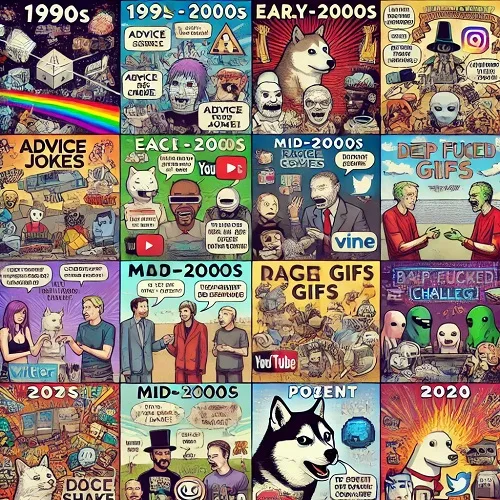The Evolution of Internet Humor: From Memes to Viral Videos

The internet has revolutionized humor, transforming it from traditional jokes to an ever-evolving landscape of memes and viral videos. The progression of online humor reflects changes in technology, culture, and social norms. This article explores the journey of internet humor, focusing on its origins, growth, and current trends.
Origins of Internet Humor: The Birth of Memes
Memes are the cornerstone of internet humor, emerging as a unique form of expression. Originating from the Greek word “mimema,” meaning “imitated,” memes began as simple images or phrases that quickly spread across forums and early social media platforms. They allowed users to share a collective joke, often reflecting societal trends or satirizing current events. The iconic “Doge” and “Grumpy Cat” memes are prime examples, embodying the playful and relatable nature of early internet humor.
The Rise of Viral Videos: Humor in Motion
As internet speeds and video-sharing platforms improved, viral videos became a dominant force in online humor. Platforms like YouTube and Vine enabled the rapid sharing of short, humorous clips, often featuring unexpected or absurd situations. Videos such as “Charlie Bit My Finger” and “Gangnam Style” not only entertained millions but also showcased the global reach of internet humor. The shift from static images to dynamic videos marked a significant evolution, allowing for more complex storytelling and comedic timing.
The Role of Social Media: Spreading Laughter
Social media platforms have played a crucial role in the dissemination of internet humor. With the rise of Facebook, Twitter, and Instagram, memes and videos could reach wider audiences than ever before. These platforms also allowed for rapid feedback and adaptation, with content creators quickly responding to trends or viewer reactions. Hashtags, challenges, and trends further fueled the spread of humor, creating a constantly evolving online culture.
Humor in the Age of Influencers: Personal Brands and Content Creation
The influencer era brought a new dimension to internet humor, with individuals building personal brands around their comedic content. Influencers leverage platforms like TikTok and Instagram to create short, engaging videos that resonate with their followers. This personal touch adds a layer of authenticity, as audiences feel a direct connection with the creators. Influencers like Lilly Singh and Zach King have become household names, known for their unique comedic styles and relatable content.

The Impact of Internet Humor: Beyond Entertainment
Internet humor has transcended mere entertainment, becoming a tool for social commentary and activism. Memes and viral videos often address serious issues like politics, climate change, and social justice, using humor as a means to engage and inform. The satirical nature of these formats can highlight absurdities and contradictions, prompting viewers to think critically about the issues presented. This trend demonstrates the power of humor as a medium for discourse and reflection.
The Future of Internet Humor: What Lies Ahead?
As technology continues to evolve, so too will the landscape of internet humor. Emerging technologies like augmented reality (AR) and virtual reality (VR) are poised to create new comedic experiences, immersing users in interactive, humorous worlds. Additionally, the increasing use of artificial intelligence (AI) in content creation could lead to novel forms of humor, with AI-generated jokes and memes pushing the boundaries of creativity. The future of internet humor is bound to be as dynamic and unpredictable as its past, promising endless possibilities for laughter and connection.
